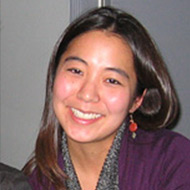
卒業生・同窓生便りの第28回は、Folger Levin & Kahn法律事務所で弁護士をされている桑原朋子さんからです。あさひには小学部1年生からサンタモニカ校へ9年間半通われました。現地校とあさひの勉強を両立させることは容易ではなく、木曜日から金曜日の夜まではその他のことを犠牲にして、あさひの勉強に集中する生活を過ごされました。現地校での勉強が忙しくなり、高1の途中であさひは辞めることになりましたが、あさひで長い期間学んだことにより、日本語での世界が大きく広がったことや多くの親しい友達を得ることになりました。現地の高校を卒業後、スタンフォード大学工学部へ進学、学位を取得、その後、ミシガン州立大学でコミュニケーションの分野で修士を終え、さらに南カリフォルニア大学で法学博士課程を終了しました。現在仕事の関係では、日本の顧客は少ないようですが、2カ国の言語と文化を学んだ結果、考え方の多様性がわかるようになり、外国の顧客のニーズも理解できるようになっているとのことです。在校生の皆さんには、あさひで学んだことが必ず役に立つことを信じて、頑張って欲しいことを伝えてきています。
あさひ学園中学を卒業してから、自分でも驚くほど様々なことがありました。アメリカ ンスクールの高校卒業、スタンフオード大学卒業、ミシガンステート大学院卒業、とUSCロースクール卒業。ここに書ききれないほどいろいろな所に住みました。去年はフェデラルのアピールコートの判事の下で1年間、働きました。この秋から、ロサンゼルスの法律事務所で弁護士として働き始めました。この十五年間いつも、私は何かにチャレンジしてきました。振り返って見ると、あさひ学園での経験がどんなにか私の人生に影響してきたかがわかります。日本語の読み書きができる楽しさも見えてきました。私はアメリカで生まれ育ち、英語を主に使う二世アメリカ人です。もう実家には住んでいないので、数週間日本語を使わないこともあります。そんな時には日本語が少しずつ私から去って行ってしまう気がしますけれど、あさひと両親と祖母のおかげで、ちょっと日本語の会話をすれば、すぐ言葉が戻ってきます。
幼いころ、親はしつこく「二国語を話せることはいずれ貴女の為になる」と言い続けて来ました。親が、熱心にそれを信じていたから、私は毎週土曜日に学校へ九年半通いました。残念ながら、高一の途中、アメリカンスクールの勉強が激しくなり、あさひをやめました。その九年間、あさひへ通う準備は木曜日から始まり、金曜日夜遅くまで続きました。土曜日は母があさひの先生でしたから、兄と私は朝早く起き、誰よりも早くあさひへ行きました。ガールスカウトはやめ、金曜日の夜と土曜日は友達と遊ぶのを諦めました。しかし、あさひに、頑張って通い続けた事により、二つ素晴らしいことを得ました-日本語と友達です。日本語はたくさんの宿題をこなし、必死に努力したから、日本語を話せるだけではなく、文法、読み書きまでしっかり身につきました。これはあさひのおかげです。 言葉は私達の人生の見方、語り方、思い出の記録に形を付けます。幼い時から二国語を使っていたから、一つの人生だが、微妙に違う二つの体験を持つことができました。おおげさと思うかもしれませんが、日本語の言葉を英語に訳せなかった時、英語にその言葉が全くなかった時を考えてください。日本語か英語を選ぶことによって、自らの経験にも微妙な違いが出てきます。
あさひに通っていてよかったと思ったのは、卒業後何年か経ってからの事でした。二国語話すことは二つの文化を知ることになります。大学やロースクールに通っている間、二つの文化を知ることは、本当に私の為になることなのかよく迷いました。両国語を話せることはもちろんプラスですが、日本とアメリカの文化はあまりにも違い、期待されることもよく正反対のことがあり、自分の中でよく混乱しました。私の中にいるアメリカ人と日本人がよくぶつかりました。いろいろ悩んだ結果、簡単な答えが出ました。一つの答えはなくいろいろな答えがあると言う単純な考えでした。今、弁護士になった自分には、この考えがとてもプラスになっています。特に、文化の違う外国のクライエントを理解することができるようになりました。
それだけでなく、あさひで知り会った友達がいます。その多くは一年生からずーとあさひへ通った同級生です。楽しい思い出をいっぱい作りました―運動会、クラスのいたずら、カラオケ、音楽のテープ、日本のドラマを夢中で見たスリープオーヴァーなど。日本にもっとつながっている友達からは、思い出だけではなく、日本でポピュラーなことや、流行っていることなどを知ることができました。今はお互いの結婚式に招待されたり、いっしょに食事をしたりしています。
あさひのおかげで、テレビ、音楽、食べ物、本など、日本語でも英語でも楽しめます。それに、一世の皆様のお手伝いもさせてもらっています。ロースクールの学生のころ、ジャパニーズアメリカンバーアソシエイションの法律クリニックでヴォランティアをしました。英語が苦手の一世の方々の翻訳を務め喜ばれました。弁護士になった今も、そのサービスを続けたいと思います。そして、そのクリニックで「日本語はどこで、勉強したんですか」と聞かれる度に、誇りを持って、「あさひ学園」と、答えています。
It’s hard to believe how much has happened since I graduated from 9th grade at Asahi Gakuen. I finished American high school, graduated with a B.S. from Stanford University, an M.A. from Michigan State University, and finally a J.D. from the University of Southern California. Throughout the years, I have had more internships and jobs and addresses than will fit in this column. Last year I clerked for a Ninth Circuit federal judge. And this fall, I’m finally settling in to life as an attorney in Los Angeles. The last fifteen years have been challenging and thrilling. And I realize now that all of this was made possible because of the fifteen years prior.
Looking back I realize how Asahi has contributed to my life and how unusual my bilingual and bicultural skills are. I am a second generation Japanese-American, born and raised in America, who has visited Japan three times for a cumulative total of 2 months, and who speaks mostly English. Because I no longer live with my parents, some weeks, I don’t speak any Japanese, and I feel the language slipping away from me, word by word. But, in a testament to Asahi Gakuen and my parent’s and grandmother’s persistence, and against all odds, it takes only a brief exchange in Japanese to unlock the language again.
Growing up, I listened to my parents who tirelessly told me that knowing two languages would be an asset to me. Because they believed this fervently, I went to school every Saturday for nine and a half years. Unfortunately, mid-way through 10th grade, my American school activities took priority, and I had to leave Asahi. But for those nine years, I started preparing for Asahi on Thursday nights when I started my homework cram session that lasted late into Friday nights. Because my mother taught at Asahi, my brother and I would get up early on Saturdays and arrive at school before everybody else. I gave up Girl Scouts, going out on Fridays, and hanging out on Saturdays.
Through all of this, Asahi Gakuen gave me two valuable things: the Japanese language and lifelong friends. Because I learned Japanese by speaking Japanese at home and attending kokugo classes at Asahi, I became fluent and literate in Japanese, not merely conversant. This is the difference that Asahi Gakuen makes. Language shapes how we view our lives, retell our memories, and share our stories. Because I was entrenched in both languages at a young age, I lived one life but experience it in two subtly different ways. If that seems like exaggeration, imagine all the times you have come across a word in Japanese that you could not translate into English, not because your vocabulary was lacking, but because the word simply did not exist in English. Depending on which language you choose to retell your story or explain your thoughts, subtle differences arise in your experience.
The greatest impact of this, however, came years after graduation. Because I grew up immersed in both languages, I also grew up with both cultures. Throughout college and law school, I periodically doubted whether being bicultural was an asset. Fluency in Japanese was indisputably helpful, but it came with the cultural baggage of straddling two fundamentally different cultures and expectations. I would often catch what I labeled my “Japanese” side second-guessing my “American” side and find myself mired in an internal conflict that seemed impossible to reconcile. It was the classic second-generation search for identity. But with this struggle, came insight. There is no one answer, but perhaps two or more. The idea is so simple, it is easy to brush it aside. But, as a lawyer, this insight is extremely valuable in interacting with all people, and especially when it comes to understanding international clients from a different culture.
I also now have lifelong friends from Asahi. I’ve known many since first grade. We share many memories: undoukai, class shenanigans, karaoke, mix tapes, sleepovers watching Japanese dramas. Through my Asahi friends, many of whom were more connected to Japan, I not only shared memories but also learned about the Japanese popular culture. Now we attend each other’s weddings and still get together for dinners.
There are other perks from my Asahi experience: I can enjoy more television shows, music, food, and books. I am also able to help the Issei community. As a law student, I volunteered at the annual law clinic put on by the Japanese American Bar Association, translating for native Japanese clients who were in need of legal advice. Now a lawyer, I hope to continue to serve in this capacity. And when I volunteer, people will ask me, as they always do, where did I learn my Japanese? And I will be proud to say Asahi Gakuen.